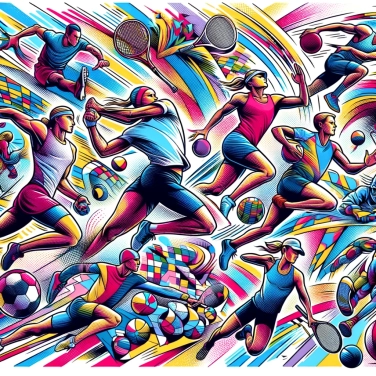Some tennis players scream when they hit the ball in order to release energy and focus. This scream, also known as 'grunting', can help improve the power and accuracy of their shots.

When players hit the ball, they often exhale forcefully to release muscle tension generated by intense effort. This quick exhalation allows for better contraction of the abdominal muscles and enhanced body support during the strike. Essentially, shouting is an instinctive way to stabilize the torso by creating high intra-abdominal pressure, which improves the efficiency of the motion. It also facilitates a more regular breathing pattern, thus preventing breath holding during powerful or repetitive shots. In short, this surprising noise mainly stems from a physical reflex of our body trying to optimize its movements during maximum effort.
Shouting at the moment of striking significantly increases the muscle strength of players, as it helps them expel air violently and thereby contract their abs more effectively. It's the same principle as in martial arts: exhaling loudly while striking allows for better muscle coordination and a more explosive strike. The shout also improves the consistency and accuracy of the movement because it facilitates a regular breathing rhythm. In short, letting out a good yell is just another technique to boost one's strikes and gain a few precious milliseconds of reaction time.
Screaming allows some tennis players to release stress or mental pressure, especially at a high level. The scream acts as a kind of psychological safety valve, releasing the tension accumulated during rallies. Others use screaming to boost their concentration, stabilize their emotions, and enhance their sense of self-confidence. This trick can have an intimidating effect on the opponent, creating an impression of power and assurance in the screamer. Some players even become dependent on this habit, finding it impossible to hit hard without making noise. It's no wonder that this can annoy some opponents and provoke negative reactions from the crowd!
In professional tennis, the act of shouting is quite controversial. Some see it as a deliberate strategy to distract the opponent, or even to mask the sound of the ball at impact, an important element in reading the game. Some players and spectators find these noises irritating, even disturbing. Several voices are calling for strict regulation, with anti-noise measures. In contrast, others view these shouts as a simple natural expression of athletic effort. The debate continues, with mixed opinions on the usefulness, sportsmanship, or even the fair play of these shouts on the court.
In other explosive sports like karate or weightlifting, vocalizing strength during effort is quite common. In martial arts, for instance, letting out a shout, called kiai, helps accompany techniques by releasing energy more effectively and intimidating the opponent. Throwing weights or javelin are other examples where athletes can produce sounds to optimize their power. But in tennis, it stands out mainly for its consistency and sometimes exaggerated volume, perhaps because repeated efforts require constant management of breathing and intensity. In short, if it is so surprising in tennis, it is mainly because these cries punctuate the entire match.
Scientific studies suggest that yelling while hitting a tennis ball can increase the speed of the shot by about 4 to 5%, due to better synchronization of breathing and abdominal muscles.
The scream during a tennis shot can also briefly distract the opponent, thereby reducing their ability to accurately anticipate the ball's trajectory.
Although primarily associated with modern tennis, the shout is also traditionally linked to martial arts techniques, helping to focus energy, enhance mental concentration, and regulate breathing.
Some junior competitions now require sound limits during tennis matches due to repeated complaints about auditory distractions from players and spectators.
Indeed, several studies and opinions from professional players indicate that a loud and repetitive shout could distract the opponent by disrupting their perception of the sound of the ball at the moment of impact, which has led to some controversies at the professional level.
Currently, there are no specific rules that directly penalize shouting in tennis. However, an umpire can intervene if the screams are perceived as deliberately excessive or unsportsmanlike towards the opponent.
Yes, the cry during exertion can be found in other sports disciplines such as weightlifting, combat sports, and athletics, where it can also help athletes improve their performance through breathing and muscle activation.
Yes, with specific physical preparation, coaching sessions, and breathing exercises, it is possible for players, especially young athletes in training, to better control or moderate their vocal expressions during matches.
Yes, some researchers argue that yelling helps generate greater muscle strength, facilitates exhalation, and improves breathing rhythm, thereby allowing for a more powerful and optimized strike.

No one has answered this quiz yet, be the first!' :-)
Question 1/4